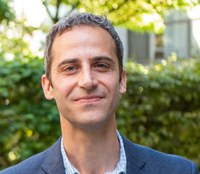Yoann Olivier
Presentation
 Yoann Olivier obtained a Ph.D. from the University of Mons in 2008. From 2009 to 2013, he held a postdoctoral fellowship from Belgian National Fund for Scientific Research (FNRS) and went on postdoctoral stays with Prof. Claudio Zannoni at the University of Bologna and Prof. Henning Sirringhaus at the University of Cambridge.
Yoann Olivier obtained a Ph.D. from the University of Mons in 2008. From 2009 to 2013, he held a postdoctoral fellowship from Belgian National Fund for Scientific Research (FNRS) and went on postdoctoral stays with Prof. Claudio Zannoni at the University of Bologna and Prof. Henning Sirringhaus at the University of Cambridge.
From 2013 to 2019, he was a research associate at the University of Mons and recently joined in July 2019 the Chemistry and Physics departments of the University of Namur as a lecturer.
His research interests deal with the understanding of electronic processes in organic conjugated (small molecule and polymers) and 2D materials, using a multiscale approach combining quantum-chemical methods, Monte Carlo approach and molecular dynamics simulations. Recently, he developed an interest in a new class of materials for organic light-emitting diodes exhibiting thermally activated delayed fluorescence, focusing on their electronic structure and their energy transport properties.
Contact : Yoann Olivier
Research
MIS PROJECT Imagine | Influence of Magnetic Effects on SpIN Conversion in Pi-Conjugated Light Emitting Organic Materials Development of a multi-scale atomistic modeling approach
OLEDs generate light by converting electrically generated excitons into light. Given that the charges injected into the organic layers recombine in a 1: 3 singlet triplet (S1-T1) ratio, fluorescent OLEDs have an internal quantum efficiency (IQEs) limited to 25%.
Recently, the TADF phenomenon, which converts triplets to singlets via an inverse intersytem crossing mechanism, has become the most popular design strategy for achieving 100% IQEs. Maximizing RISC requires two conditions: a small difference in energy DEST between S1 and T1 and a large spin mixing between the singlet and triplet states involved. This spin mixing has different origins, namely the spin-orbit coupling, the hyperfine interaction and the delta g mechanism which are called magnetic field effects (MFEs). Since organic semiconductors are made up of elements from the highest rows of the periodic table, these MFEs are very weak and can compete with each other. In addition, the light emitting layer (EML) of an OLED is composed of a host material doped in low emitter concentration such that light emission is governed by the nature and dynamics of charge carriers and excitons to the host-guest interface.
IMAGINE will aim to identify the relevance of these different MFEs responsible for the singlet-triplet conversion in TADF materials. Due to the absence of experimental techniques capable of discriminating between the different MFEs, the complexity of the problem which involves electronic processes taking place at length scales associated with the EML of OLED, we will develop a multiscale approach which will include all sources of spin mixing. With IMAGINE, we hope to fill a void in the field of electronic organics, where spin effects are largely ignored and thus open up perspectives for new material design strategies.
This abstract is also available in French here...
His mentor - Jean-Luc Brédas - University of Arizona
 Choosing Jean-Luc as mentor for my NARC fellowship was an obvious choice to me and I feel very lucky that he accepted my proposition. Jean-Luc is clearly one of the leading scientists who worked and still works in the field of functional pi-conjugated materials. He is with his PhD supervisor Prof. Jean-Marie André from the University of Namur, one of the scientists who introduced computational molecular modeling to experimentalists and especially showed them how useful it could be in order to understand the properties of their materials as well as to design new ones with improved features.
Choosing Jean-Luc as mentor for my NARC fellowship was an obvious choice to me and I feel very lucky that he accepted my proposition. Jean-Luc is clearly one of the leading scientists who worked and still works in the field of functional pi-conjugated materials. He is with his PhD supervisor Prof. Jean-Marie André from the University of Namur, one of the scientists who introduced computational molecular modeling to experimentalists and especially showed them how useful it could be in order to understand the properties of their materials as well as to design new ones with improved features.
I am glad to know Jean-Luc since 2004 when I started my PhD; visiting his laboratory back in 2007 at Georgia Tech was one of the decisive experiences to pursue an academic career. There are many lessons that I learnt from him and here are the ones I always try to remember:
- Always be curious! Don’t hesitate to speak with people with a different expertise than yours, you will certainly learn something new.
- Always try to catch the attention of your audience by delivering the most pedagogical message and by highlighting your take-home messages.
- Work on topics that you enjoy and you will certainly produce high quality work.
- Enjoy every aspect of your life and be a good and respectful person.
As my scientific “grandfather”, I can certainly say that he is a true source of inspiration in my daily research.
Memberships
 |
 |












